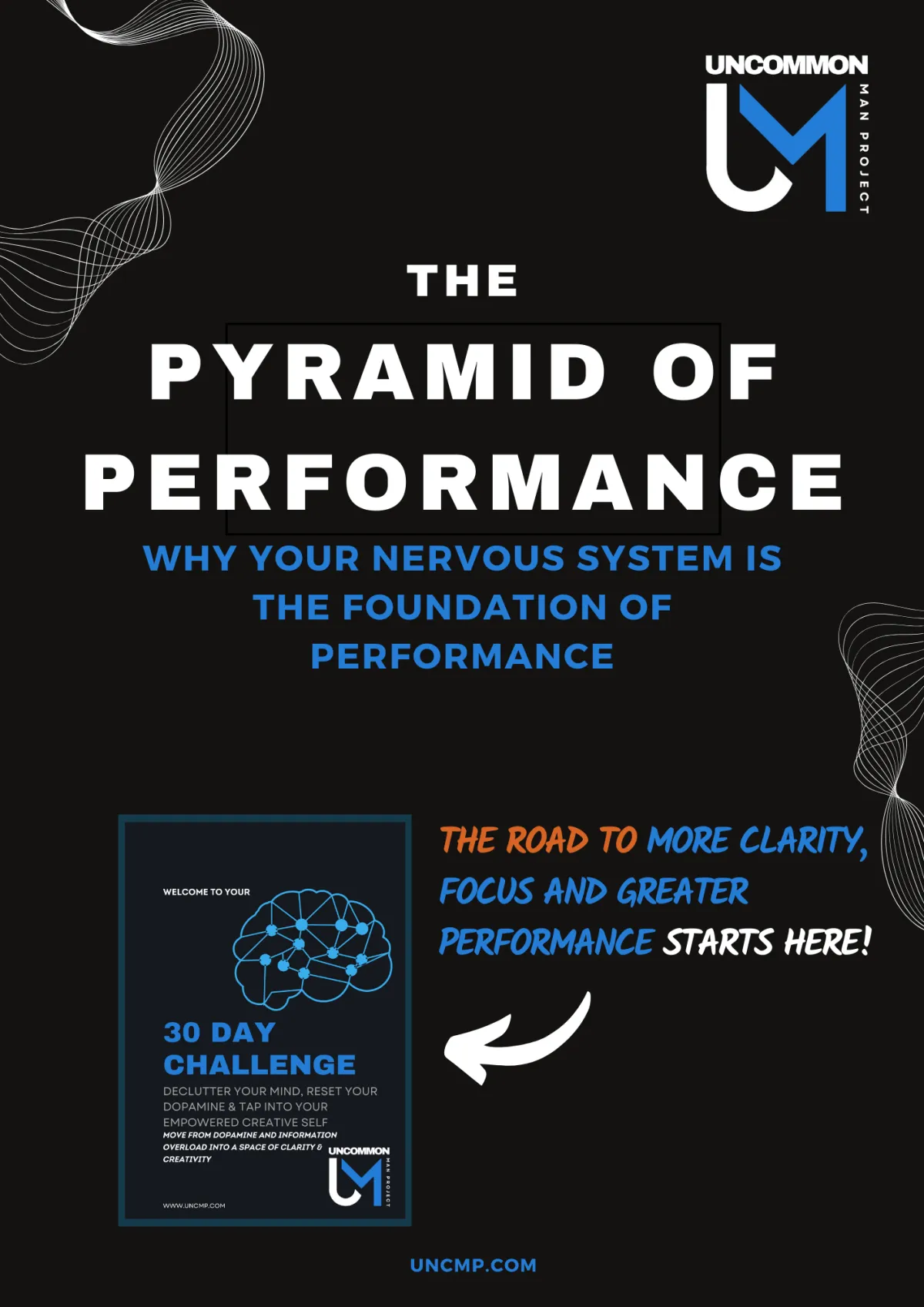Blog
Articles & Free Resources
"Real knowledge is to know the extent of one's ignorance."
-Mary Catherine Bateson

Oxytocin Unveiled: Mastering Men's Emotional Wellness & Performance
A Guide for Overwhelmed Men Seeking Understanding around Connection

This is a topic that's not just close to my heart but also crucial to our brains: the fascinating world of oxytocin and dopamine. As a passionate entrepreneur, coach and bio-hacking father, I’ve spent years studying these neurotransmitters and their impact on our lives, especially for men who are feeling a bit lost in the chaos of life.
Many have heard of oxytocin, which is commonly referenced as a hormone that can influence our love and relationships. However, few may be aware of the extensive role it can play in the functioning of the male body.
Oxytocin has been scientifically suggested to affect brain chemistry, one’s emotions and physical attraction.
We have put together an extensive 30-day challenge to rebalance your dopamine alongside understanding your other neurotransmitters. If you want to tap into not only shifting your mindset, and accountability but also neuro-chemical mastery then check it out here.
Understanding Oxytocin and Dopamine
What are Neurotransmitters?
Think of neurotransmitters as your body's communication specialists. These tiny chemical messengers are constantly at work, ensuring messages zip around your brain and body smoothly. Their job? To carry, enhance, and balance signals between neurons (our brain's nerve cells) and various target cells which could be in your glands, muscles, or other neurons.
Imagine the hustle and bustle of billions of these neurotransmitter molecules. They're like the unsung heroes keeping our brains in top form, managing everything from our heartbeat to how we learn and concentrate. They even play a role in how we feel - impacting emotions like happiness, anxiety, and excitement.
Some of the key players in this team of neurotransmitters include names you might have heard like serotonin, dopamine, glutamate, epinephrine, norepinephrine, and the ever-soothing endorphins.
Dopamine:
Role: Dopamine is often referred to as the "feel good" or "reward" neurotransmitter. It plays a vital role in our ability to feel pleasure, stay motivated, and maintain focus.
Performance: Elevated dopamine levels can boost motivation, increase focus, and improve decision-making. It can make tasks feel more rewarding, which may drive an individual to perform better.
Overall well-being: Adequate levels of dopamine are associated with feelings of pleasure, satisfaction, and motivation. Low levels can lead to feelings of apathy, lack of interest in life, and low motivation, which can be symptoms of conditions like depression.
GABA (Gamma-Aminobutyric Acid):
Role: GABA is the primary inhibitory neurotransmitter in the brain, meaning it slows down the activity of nerve cells. It helps regulate anxiety and has a calming effect.
Performance: Optimal levels of GABA can help maintain a calm focus during performance, especially in high-pressure situations. A lack of GABA can result in feelings of anxiety and over-excitement, which may hinder performance.
Overall well-being: Adequate levels of GABA contribute to relaxation, reduced stress, and better sleep. Low levels can lead to anxiety, chronic stress, and sleep disturbances. In the context of coaching, understanding these neurotransmitters can offer insights into an individual's motivation, stress levels, focus, and overall mood. Adjustments in training, rest, and mindset can help optimize these neurotransmitter levels, leading to improved performance and well-being.
Norepinephrine (also known as Noradrenaline):
Role: Norepinephrine acts as both a neurotransmitter and a hormone. It plays a significant role in the "fight or flight" stress response and helps regulate attention, alertness, and arousal.
Performance: Increased levels can sharpen focus and increase alertness, which can be beneficial in situations requiring quick reactions or deep concentration. However, chronically high levels can lead to stress and anxiety, which can be detrimental to performance.
Overall well-being: Proper norepinephrine balance is crucial for feeling alert and energized. Imbalances can lead to anxiety, mood disorders, or problems with sleep.
Serotonin
Role - Often dubbed the 'happiness neurotransmitter,' serotonin is essential in regulating mood, anxiety, and happiness. This crucial chemical in our brains doesn’t just influence our mood; it’s vital for our overall well-being. Its role extends to impacting our sleep patterns, appetite, memory, and even our sexual desire. Serotonin is a mood stabilizer, and its balanced levels are crucial for a positive state of mind.
Performance - When serotonin levels are optimal, the benefits are clear and impactful. You're likely to feel more emotionally stable, less anxious, more focused, and generally happier. This isn't just about feeling good; it's about functioning at your best. High serotonin levels contribute to better sleep, which in turn improves your ability to concentrate, make decisions, and interact positively with others. It enhances your performance both in personal and professional spheres by making you more emotionally resilient and socially engaged.
Overall Well-being - The importance of serotonin extends to our overall sense of well-being. It's not just about avoiding the lows but also about enhancing the quality of our daily life. Adequate levels of serotonin are linked to feelings of contentment and inner peace. It helps us cope with stress, reduces the likelihood of depression, and plays a critical role in preventing mood disorders. On the flip side, low levels of serotonin can lead to a range of challenges, including mood swings, anxiety, insomnia, and even depression.
How do Neurotransmitters Work?
Now, let’s talk about how these neurotransmitters pull off their incredible feat. Neurons, the cells in our brain, need to pass messages to each other, but they're not directly connected. At the end of each neuron is a tiny space called a synapse, and for the message to keep moving, it has to cross this gap.
Here's the cool part: when an electrical signal zooms down a neuron, it triggers tiny sacs filled with neurotransmitters to release their contents into the synapse. Then, these neurotransmitters embark on a tiny journey across the gap to the next cell. This next cell has special receptors, kind of like a lock waiting for the right key. When the neurotransmitter, our key, fits into the receptor, the lock, it triggers changes in the cell.
Depending on the type of neurotransmitter, it can either excite the next cell to pass the message along or inhibit it, putting a pause on the message. It's a bit like a game of red light, green light, but at a microscopic level and happening at lightning speed in your brain!
This lock-and-key system ensures that every neurotransmitter plays its specific part, either moving the message forward or holding it back. That's how your brain can process a myriad of thoughts, actions, and emotions every single second.

What Is Oxytocin?
Oxytocin is generally known as a hormone that also functions as a neurotransmitter- classified as a peptide—helping transfer signals in the brain. It is generally produced in the hypothalamus and can be stored and released into the bloodstream by the posterior pituitary gland, per recent research from Harvard Medical School.
Physically, its important to note that oxytocin plays a crucial role in sperm motility and orgasm function in men, possibly enhancing the parent-child bond in both sexes. However, it has also been shown to influence emotions, sexual desire and trust.
“Brain oxytocin modulates social behaviors, including maternal care and aggression, pair bonding, sexual behavior, social memory and support, and human trust, and downregulates stress responses, including anxiety,” said Inga D. Neumann.
Oxytocin, often referred to as the "love hormone," has long been the subject of fascination and curiosity when it comes to matters of the heart. Many people wonder what role this powerful neurotransmitter plays in the intricate dance of falling in love.
Current studies suggest that when a couple is in the early stages of falling in love, their brains produce substantially more oxytocin than they otherwise would. This surge of oxytocin is believed to play a crucial role in forming and maintaining romantic attachments, as well as influencing sexual activity and desire. The presence of oxytocin has also been linked to social interaction and behavior, trust, empathy, and even stress and anxiety disorders.
However, it's important to remember that oxytocin doesn't work alone in the realm of love. Other neurotransmitters, such as serotonin and dopamine, are frequently present when the love hormone is at work. These chemicals work in tandem, creating a symphony of emotions and sensations that contribute to the blissful experience of falling in love.
Additionally, oxytocin is not exclusively limited to romantic relationships. It is a versatile neurotransmitter that plays a role in many human interactions, regardless of whether they have a romantic context or not. Oxytocin contributes to feelings of connection, bonding, and trust, which are essential components of fulfilling relationships of all kinds.
So, the next time you find yourself swept off your feet or feel that fluttering sensation in your heart, remember that oxytocin is one of the key players behind the scenes, orchestrating the sensation of love that unfolds within us. It is a powerful force that brings us closer to one another, nurturing our relationships and providing us with the emotional and physical fulfillment we crave.
An interesting observation….
This may be true in your own life. You may find that the more time you spend being intimate or sexually active with a partner, the stronger these feelings grow. This close contact can stimulate the production of oxytocin in your brain, which can lead to pleasurable sensations—potentially creating a feedback loop to make the continued behaviour rewarding.
For many, the more time you spend with your partner, the more oxytocin your brain might produce. Do you find this true for yourself?
The Impact of Oxytocin on Men's Mental Health
Men, listen up. Our society often brushes off emotional wellness, but it's time we talk about it. Oxytocin isn't just for women; it's vital for us too.
Oxytocin and Your Mood
Ever felt a rush of warmth after a hearty laugh with friends or a hug? That's oxytocin at work. It helps regulate stress and can be a real game-changer for your mental state.
Oxytocin and Performance
Logically looking at what oxytocin does, it connects and facilitates connection, alongside serotonin and dopamine.
“We will argue that since oxytocin is linked to key processes relevant to team sport, such as empathy, trust, generosity, altruism, cohesion, cooperation, and motivation, it provides an important biopsychological basis for expert performance in (team) sports.” - Extract from Oxytocin and the Biopsychology of Performance in Team Sports Gert-Jan Pepping* and Erik J. Timmermans
An imbalance or a lack of any of these Neurotransmitters may lead to a lack of performance, focus and team-based communication.
Personal Anecdote: The Power of a Hug
I remember a time when I was completely overwhelmed with work. It was a brief hug from a friend that brought me back from the brink. That moment of connection triggered something in me, and it was all thanks to oxytocin. Same as when one connects with their loved ones or even animals, the physical touch does wonders to our health.
In a touch-deprived world where so many of us are stuck online, getting out, holding hands, making actual contact is crucial to our survival, touch is essential, it is not natural to not engage in touch.
Oxytocin, Connection, and Purpose in Men
Building Bridges
As men, forming deep connections can sometimes feel like a challenge. But oxytocin is there to help us build those bridges, fostering a sense of belonging and purpose.
How Oxytocin Affects Men
Though the same things in both sexes can trigger oxytocin, it may affect males and females differently. For example, the hormone may heighten a man’s sense of competitive relationships, though women might feel emotions related to caring and closeness. Researchers currently believe this may be due to differences in amygdala structure, the area of the brain that is thought to be connected to emotional processing in many. Additional effects of oxytocin in the male body can include:
Shaping Responses in Social and Emotional Contexts: This involves altering the way individuals respond and adapt to various social interactions and emotional circumstances.
Enhancing Intimate Connections: Particularly significant in fortifying the bonds between parents and children, as well as in romantic partnerships.
Transforming Interpersonal Interactions: This refers to the changes in the way individuals engage and communicate with others.
Amplifying Feelings Associated with Love: There's an increase in both the intensity and frequency of emotions related to love and affection.
Boosting Trust in Relationships: This aspect is crucial for sustaining and developing trust within various types of relationships.
Modulating Stress and Anxiety: This can lead to a reduction or, in some cases, an increase in symptoms related to stress and anxiety disorders.
Influencing Competitive Emotions: This aspect plays a role in how competitive feelings are experienced and expressed.
Elevating Specific Emotional States: This includes an increase in the intensity and frequency of emotions such as loyalty or jealousy.
Affecting the Fight-or-Flight Mechanism: This involves having an impact on the body's natural response to perceived threats or stress.
Beyond Fatherhood
Interestingly, oxytocin plays a huge role in fatherhood. Studies show that it enhances the parent-child bond, not just in women but in men too. It’s about more than just biology; it’s about forming lasting, meaningful connections.
Beyond the crucial role it plays in childbirth, oxytocin is generally known for strengthening the bond between a parent and child after birth. According to a groundbreaking new study conducted by leading researchers in the field, it has been found that there is no significant difference in the levels of oxytocin, often referred to as the "love hormone," between mothers and fathers when it comes to their bond with their children. This revelation challenges the traditional beliefs and stereotypes surrounding the mother-father dynamic in terms of emotional connection and attachment. The study involved closely analyzing and comparing the hormonal levels of both mothers and fathers during crucial bonding moments with their children, such as feeding, cuddling, and playing. The findings shine a light on the importance of recognizing the unique emotional experiences and connections that fathers can have with their children, dismantling the notion that mothers are the sole nurturing figure in a child's life.
Symptoms of Low Oxytocin
Low oxytocin levels, can be characterised by several different symptoms, including a strong sweet tooth, muscle aches, trouble sleeping, sexual difficulties, anxiety disorders and generalised irritability.
You may notice several symptoms if you have an oxytocin deficiency, though it is important to note that many of these could indicate another condition or disorder. If you are concerned you may have an oxytocin imbalance, you may consider speaking to your healthcare provider to learn more about the options available to you.
Practical Ways to Increase Oxytocin Levels
Little Things Matter
You don't need grand gestures to boost oxytocin. Simple acts like playing with your pet, sharing a meal with someone, or even a firm handshake can do the trick.
Somatic Practices
As a somatic coach, I’ve seen firsthand how body-oriented practices can enhance oxytocin production. Think yoga, meditation, or even dancing in your living room!
Taking Ownership of Mental, Emotional, and Physical Health
It's All Connected
Your mental, emotional, and physical health are intertwined. By taking care of one, you're helping the others. Regular exercise isn't just good for the body; it's a dopamine and oxytocin booster.
Express to Process
Gentlemen, it's okay to express emotions. In fact, it's necessary. Acknowledging and expressing what we feel is crucial for emotional health and can even give your oxytocin levels a bump.
The Role of Professional Help
Knowing When to Seek Help
There's no shame in seeking help. Whether it's a therapist, a coach, or a support group, getting professional guidance can be a game-changer in managing your neurotransmitter balance and overall well-being.
From My Experience
I've seen many men transform their lives by understanding and harnessing the power of oxytocin and dopamine. It's not just about science; it's about applying that knowledge to live a more connected, fulfilling life.
This was never meant to be a journey where you are alone, find a community a space that builds, elevates and embraces your authenticity, you.
Conclusion
Understanding the link between oxytocin and dopamine is more than just neuroscience. It's a roadmap to a more connected, purposeful life. By embracing the power of these neurotransmitters, you're not just improving your mental and emotional health; you're taking a significant step toward finding your purpose and owning your life.
If you are up for the Challenge, jump in on into our 30-Day Challenge
and if the journey feels lonely and you are seeking community, there are a lot of incredible men that have done the work and are the bedrock of Uncommon Man Project - Join our facebook group to find out more
Stay Uncommon.
Start YOUR Challenge!



